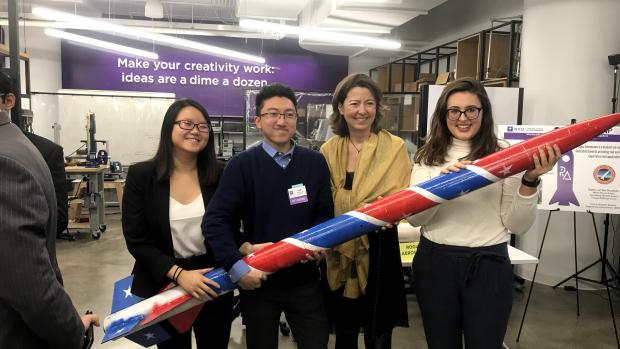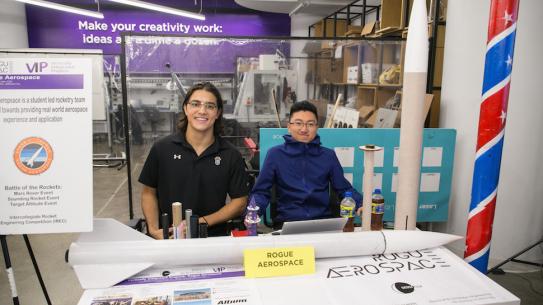Rocketing to new heights
Tandon’s student rocketry project has blasted off

Getting approved as an official school club takes some time — for one thing, it means creating a mission statement and programming outline, attracting a certain number of members, and recruiting a faculty advisor, among other tasks. So a few years ago, a group of eager students interested in rocketry decided to “go rogue.”
Now, despite its iconoclastic name, Rogue Aerospace enjoys official status as part of Tandon’s Vertically Integrated Projects (VIP) program, which enables students to earn academic credit for taking part in hands-on, multidisciplinary projects of real-world importance.
Rising junior Jefferson Hu, the team’s captain, explains that being a rocketry enthusiast in New York City has its challenges. “It’s not as though you can walk out onto Flatbush Avenue and test what you’ve built,” he says. “We have to travel upstate for trials.” (Hu is no stranger to the geographic constraints of working in an urban environment; he is also a veteran of Tandon’s Concrete Canoe team — which requires practicing rowing on a large body of water, preferably one that is also clean and placid.)
This past year the team, advised by Industry Associate Professor of Mechanical and Aerospace Engineering Nicholas DiZinno, built three rockets, which they used to participate in the Battle of the Rockets Competition, held in April in Culpeper, Virginia. The contest consists of three components: the Target Altitude Event, which requires rockets to reach at least 1,000 feet; the Rover Event, which adds the complexity of designing and building a small autonomous robot that must survive launch, deployment, and landing; and the Sounding Rocket Event, which asks participants to launch a sounding rocket to a specific altitude using a commercial certified G rocket motor. (The payload must include sensors and a XBEE radio transmitter to send telemetric data.)
The team, many of whose members hold certification from the National Association of Rocketry, performed admirably during their first major contest: two of the three rockets survived the grueling Battle intact. Hu and his teammates are currently researching competitions for the coming year, and they are leaning toward either focusing on the NASA Student Launch, which will take place in Alabama, or the Spaceport America Cup, being held in New Mexico.





